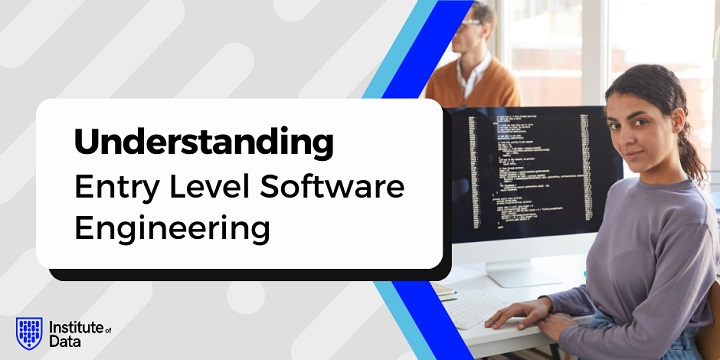Understanding the Role of an Entry Level Software Engineer

What is an Entry Level Software Engineer?
An entry level software engineer is a professional who is just beginning their career in software development. These individuals are typically recent graduates or those who have recently transitioned into the tech industry. Entry level software engineers work under the supervision of more experienced engineers, assisting with coding, debugging, and developing software applications.
Key Responsibilities
- Writing Code: Implementing features and fixing bugs using programming languages like Python, Java, C++, or JavaScript.
- Testing: Creating and running tests to ensure the software works as intended.
- Debugging: Identifying and fixing issues within the code.
- Collaboration: Working with other team members, including senior engineers, designers, and project managers, to deliver software projects.
- Documentation: Writing documentation for code, including comments and user guides, to help others understand and use the software.
Educational Requirements and Relevant Degrees
Degrees
While some software engineers are self-taught, having a formal education can provide a strong foundation. Relevant degrees include:
- Bachelor’s Degree in Computer Science: Covers programming, data structures, algorithms, and software engineering principles.
- Bachelor’s Degree in Software Engineering: Focuses more specifically on the engineering aspects of software development.
- Bachelor’s Degree in Information Technology: Provides a broader view of technology, including networking and systems administration.
Alternative Educational Paths
- Associate Degrees: Two-year programs that cover the basics of software development.
- Bootcamps: Intensive, short-term programs focused on specific programming skills and practical experience.
Essential Skills for Entry Level Software Engineers
Technical Skills
- Programming Languages: Proficiency in languages such as Python, Java, C++, JavaScript, and others relevant to your desired job.
- Version Control Systems: Familiarity with tools like Git and platforms like GitHub.
- Software Development Lifecycle (SDLC): Understanding the stages of software development from planning to maintenance.
- Database Management: Knowledge of SQL and NoSQL databases.
- Algorithms and Data Structures: Ability to use and implement common data structures and algorithms.
Soft Skills
- Problem-Solving: Ability to analyze problems and come up with effective solutions.
- Communication: Clear and concise communication, both written and verbal.
- Teamwork: Ability to work effectively within a team environment.
- Time Management: Managing time effectively to meet deadlines and prioritize tasks.
Certifications and Online Courses
Valuable Certifications
- Certified Software Development Professional (CSDP): Offered by IEEE, this certification demonstrates proficiency in software engineering.
- AWS Certified Developer – Associate: Validates cloud development skills on Amazon Web Services.
- Microsoft Certified: Azure Developer Associate: Validates skills in developing solutions on Microsoft Azure.
Recommended Online Courses
- Coursera: Offers courses from universities and companies, such as “Python for Everybody” by the University of Michigan.
- edX: Provides courses like “CS50’s Introduction to Computer Science” by Harvard University.
- Udacity: Nanodegree programs in various specializations like web development, data science, and more.
Gaining Practical Experience
Internships
- Benefits: Provide real-world experience, networking opportunities, and a foot in the door.
- Finding Internships: Look for opportunities on job boards, company websites, and through university career services.
Open Source Contributions
- Why Contribute?: Gain experience, build a portfolio, and connect with other developers.
- How to Start: Look for projects on GitHub that interest you and start with small tasks or bugs.
Personal Projects
- Importance: Demonstrate your skills and creativity to potential employers.
- Ideas: Develop a personal website, create a mobile app, or contribute to a community project.
Building a Strong Portfolio
What to Include
- Projects: Showcase a variety of projects that demonstrate different skills.
- Code Samples: Include links to your GitHub repositories.
- Blog: Write about your projects, challenges, and learnings to demonstrate your communication skills.
- Resume: Keep it updated and tailored to the jobs you are applying for.
Presentation Tips
- Clarity: Make sure your projects are well-documented and easy to understand.
- Professionalism: Use a clean and professional design for your portfolio website.
- Updates: Regularly update your portfolio with new projects and achievements.
Job Search Strategies
Networking
- Online: Join forums, social media groups, and attend virtual meetups.
- In-Person: Attend industry conferences, workshops, and local meetups.
Job Boards
- General: LinkedIn, Indeed, Glassdoor
- Tech-Specific: Stack Overflow Jobs, GitHub Jobs, AngelList
Applying for Jobs
- Tailor Your Resume: Customize your resume for each job application.
- Cover Letters: Write personalized cover letters that highlight your relevant skills and experiences.
- Follow-Up: After applying, follow up with a polite email to express your continued interest.
Preparing for Technical Interviews
Types of Interviews
- Phone/Screening Interviews: Initial interviews to assess basic technical and communication skills.
- Technical Interviews: In-depth interviews that include coding challenges, algorithm questions, and problem-solving tasks.
- Behavioral Interviews: Assess your soft skills, such as teamwork, communication, and problem-solving abilities.
Common Technical Interview Questions
- Algorithms and Data Structures: Sorting algorithms, linked lists, trees, graphs, etc.
- Coding Challenges: Writing code on a whiteboard or online coding platforms.
- System Design: Designing scalable systems and explaining your thought process.
Preparation Tips
- Practice Coding: Use platforms like LeetCode, HackerRank, and CodeSignal.
- Study Algorithms: Understand common algorithms and their applications.
- Mock Interviews: Conduct mock interviews with peers or use online services.
Day-to-Day Responsibilities of Entry Level Software Engineers

Typical Tasks
- Coding: Writing and testing code for new features or bug fixes.
- Code Reviews: Reviewing code written by peers and providing feedback.
- Meetings: Participating in team meetings, stand-ups, and planning sessions.
- Learning: Continuously learning new technologies and improving your skills.
Tools and Technologies
- IDEs and Text Editors: Visual Studio Code, IntelliJ IDEA, Sublime Text
- Version Control: Git, GitHub, Bitbucket
- CI/CD Tools: Jenkins, Travis CI, CircleCI
- Communication Tools: Slack, Microsoft Teams, Zoom
Career Growth and Development
Mentorship
- Finding a Mentor: Look for mentors within your company or through professional networks.
- Benefits: Gain insights, receive guidance, and expand your professional network.
Continuing Education
- Advanced Degrees: Consider pursuing a master’s degree in computer science or a related field.
- Online Courses and Certifications: Keep your skills up-to-date with online learning.
Career Paths
- Specializations: Focus on areas like front-end development, back-end development, DevOps, or data science.
- Advancement: Move up to roles like senior software engineer, team lead, or engineering manager.
Common Challenges and How to Overcome Them
Impostor Syndrome
- What It Is: Feeling like you don’t belong or aren’t competent enough.
- How to Overcome: Seek feedback, celebrate your achievements, and talk to mentors or peers.
Staying Current
- Challenge: The tech industry evolves rapidly.
- Solution: Continuously learn through courses, reading, and experimenting with new technologies.
Work-Life Balance
- Challenge: Balancing work with personal life.
- Solution: Set boundaries, prioritize tasks, and take regular breaks.
Starting a career as an entry level software engineer is a rewarding journey filled with opportunities for growth and development. By acquiring the right skills, gaining practical experience, and continuously learning, you can build a successful and fulfilling career in software engineering. Remember to leverage networking opportunities, stay updated with industry trends, and seek guidance from mentors to navigate the challenges along the way. With dedication and persistence, you can achieve your career goals and make a significant impact in the tech industry.


